






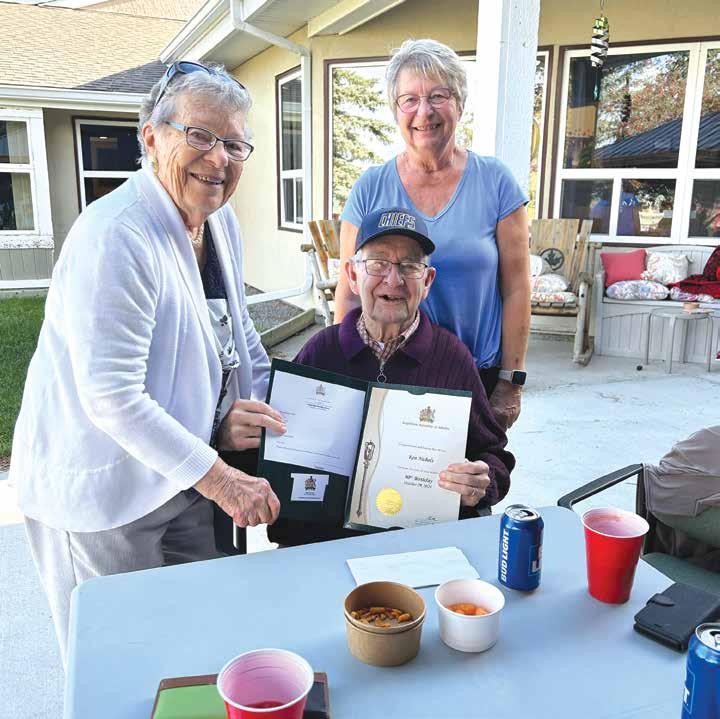

















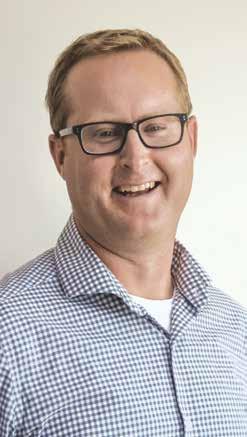
Jordon Christianson, current Chair of the Special Areas Board, has announced that he will not be seeking reappointment as Chair once his current appointment expires in September 2025. He shared this message in a letter to ratepayers this week, available on the Special Areas website.
As a Crown agency, the Special Areas Board is governed by the Alberta Public Agencies Governance Act, and that legislation includes a ten-year term limit on appointments. As a result of this decision, the Special Areas Board will be working with the Alberta Public Agency Secretariat to recruit a new Chair of the Special Areas Board. You can learn more at https://www.alberta.ca/public-agency-secretariat.
As the Special Areas Board is a public (crown) agency, recruitments to the Board are managed through this provincial body. As the Special Areas Board is unique in both mandate and structure as a provincial agency, it is expected that the three current Board members will be directly involved in the recruitment process. This will ensure that local stakeholders, including the Advisory Council, are an integral part of this important leadership recruitment.
The recruitment process is expected to begin this fall, with the intent of having the position filled in early 2025. This will allow for a substantial transition period, and ensure supports are in place to manage this change in leadership. The recruitment will be managed as an open and competitive process and will be widely advertised.
To learn more about Special Areas Advisory Council and Board members, please visit. https://specialareas.ab.ca/ about/board-and-advisory-council/.
To ratepayers and residents of the Special Areas, I wanted to share some important news with you about my role as Chair of the Special Areas Board, and how it will impact our organization over the next year.
It has been my honor to serve as Chair of the Special Areas Board since September 2015. I have the deepest respect for what we do here at Special Areas, and I have made the very difficult decision to not seek reappointment after my current term expires in September 2025. As a Crown agency, the Special Areas Board is governed by the Alberta Public Agencies Governance Act, and that legislation includes a ten-year term limit on appointments.
For me, it is time for a change. For Special Areas, it is an opportunity to find a someone who will lead this incredible organization through the next decade.
Special Areas is known province-wide for the incredible things we accomplish, and for the high level of service we provide. We are unique in our structure as we deliver services traditionally provided by municipalities while also managing public lands on behalf of the province. This unique structure is one of the reasons our region continues to be so successful. Our provincial partners understand this, and I am pleased to share this recruitment will include the three current
Board members, along with representatives from the Alberta Government. By having our board members directly involved, we can be assured local decision-making and priorities will be strongly represented in this important leadership decision.
We expect the recruitment process to take place this fall, with the goal of having the successful candidate in place by early 2025. This will be an open and competitive recruitment which will be widely advertised. I am committed to working alongside the Board throughout the recruitment and transition to make sure whoever is asked to lead Special Areas next has the resources and support they need.
Special Areas is not defined by any one person, including the Chair; instead, we are defined by everything done everyday to serve our ratepayers and the public. I feel grateful for the incredible career I have built here at Special Areas, and for all the amazing people I have met and worked with along the way.
Thank you for the support you have given me over the past ten years, and for the opportunity to get to know you and your communities better. I look forward to seeing what comes next, and to find new ways to contribute to the region.
Jordon Christianson, Chair Special Areas Board

BY JOAN JANZEN
John Wayne, an actor from the past, said, “Courage is being scared to death and saddling up anyway.”
The quote would have described how a widow in Berlin, Germany was feeling during the Second World War. Johanna Eck was in her mid-60s and had lost her husband and children.
Johanna Eck believed every human life had value; at that time those convictions were a crime. By 1941 war had transformed her neighbourhood. Suspicion fell on anyone who showed the slightest sign of dissent and neighbours betrayed neighbours. The streets were constantly patrolled and Jews were being rounded up. It was a death sentence for anyone who helped them out.
Nevertheless Johanna’s apartment became a sanctuary. Word spread quietly, and desperate people came to her door. The first woman to come to her door was Ruth; she had nowhere to go and took the risk of approaching a stranger. There was Max, a young Jewish man who escaped a deportation train to a concentration camp. Sara and her two young children whose husband had been taken in a raid. Soon Johanna’s tiny apartment accommodated more people than seemed possible.
She was alone in her brave rescue mission; no one was helping her. War dragged on and the Gestapo increased their raids, but she continued to open her doors, sheltering over a dozen people.
In the spring of 1943, Benjamin, a young Jewish boy knocked on her door. Trauma had caused him to become mute after witnessing the murder of his entire family. For weeks he didn’t say a word.
One evening Johanna began to hum an old lullaby, and a tear rolled down Benjamin’s cheek. “When will it ever be over?” he asked. It was the first time he had spoken since he lost his family.
In 1944 she opened her door to William and Ava and their children from the Netherlands. They had been betrayed by a friend and narrowly escaped a raid. They stayed for a year.
War ended in 1945, and Johanna’s acts of courage had helped preserve humanity. When Allied Forces liberated Berlin, her occupants moved on.
Johanna passed away in 1979, and in 1980 she was honoured by having her name placed on the wall of hope in a memorial garden in Israel. Although she never spoke about what she had done, the people who she had rescued never let her forget. Letters arrived from Ruth, Max and others.
Ruth moved to the US and wrote
• Submissions are limited to one letter per person per month. We do not publish letters from people living outside of this newspaper’s coverage area.
• Letters should be 300 words or less. Letters over the word limit will be cut at the editor’s discretion. All letters are subject to editing for style, mechanics and grammar.
• Letters containing language or content that is blatantly offensive, or that the editor feels is inappropriate, will not be published.
• Letters should focus on the opinion/s of the writer, not facts. Any statement of facts not generally known or accepted to be true will be removed.
• All letters must be signed by the writer, with address and phone number provided for verification only. Letters will be printed with the author’s name and city of residence only. Anonymous letters will not be published.
• Letters that contain statements that are libelous or slanderous will not be published, nor will letters that include attacks of a personal nature.
• Letters written in response to other letter writers should address the issue at hand, rather than mentioning the writer by name, and should refer to the headline and date the letter was published. Letters referring to news stories should also mention the headline and date of publication.
• Letters regarding an election issue or candidate will not be published in the issue immediately preceding election day.
All questions regarding letters to the editor should be directed to: Your Southwest Media Group Attn: Kate Winquist Box 727, Kindersley, Sask. S0L 1S0 e-mail: kate@yourwestcentral.com





letters to Johanna telling her about her family. Benjamin lived in Germany and became a teacher. In the summer of 1947 a young man appeared at her door. It was Benjamin thanking her. He explained how he had been sent to a displaced persons camp, then taken to live with a distant relative. He finished his education and had decided to go into medicine; he wanted to save others. Although he had every reason to be consumed by anger, he chose the better path.
In the 1970s Johanna’s story was documented by a historian, who interviewed children of survivors from her apartment. Her legacy lives on by the families of those who she had saved.
The quiet, unassuming hero refused their monetary gifts and offers of financial support, accepting only their gratitude. She didn’t seek recognition, and returned to her work as a seamstress.
The woman who had defied a regime said it was never about being brave; it was about doing what was right. She did it simply because “someone has to”. Today, nearly eighty years later, we need courageous people who will do what is right.
Those who are courageously stepping forward are bringing the hidden out into the open. Truth and common sense are being revealed and corruption is being exposed. An example is doc-

umentaries
such as the film ‘First Do No Pharm’. After viewing the film, Dr. Suneel Dhand described it as “eye-opening”.
“This isn’t just a one-sided story, but a well-researched expose that challenges the status quo. The evidence presented is undeniable,” he said on his online program. He noted the film reveals how big pharma fund mainstream media, cable news and medical journals.
Dr. Dhand said, “The old mantra was simple: Get sick, take the right medicine, and get better quickly. But that has shifted. Now it seems like the goal is to get as many people on medications as possible, at increasingly younger ages, for the rest of their lives.”
There’s numerous “eye-opening” documentaries being produced about topics which expose the harm inflicted on people, especially the most vulnerable.
“One positive takeaway from the past few years is that many of us who believe in change and a better future have banded together. There’s strength in numbers, and I’m optimistic that together, we can make a difference,” Dr. Dhand said.
Winston Churchill once said, “Courage is what it takes to stand up and speak; courage is also what it takes to sit down and listen.” Those words still apply today.

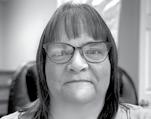
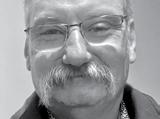



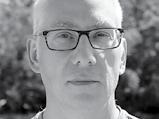
BY MADONNA HAMEL
Wandering through Moon Records in the beautiful old Customs building on Cumberland’s main drag, I am instantly drawn to the book shelves. On display are the latest nonfiction award winners. Without exception each one deals in some way or other with the themes of my family’s life right now - sudden grief due to trauma, finding wonder and enchantment in the least expected places, the challenges of mental health crises as we age or suffer from a major health threat. It is as if the whole world is waking to these forms of ‘reality’, or, perhaps more to the point, is waking to the truth of what it means to be fallible, mortal, human. But there’s something else going on here; it seems to me that once we jettisoned traditional religious or philosophical ways of framing and facing our lives we were left with a vacuum. A hole. Be it God-shaped, hero-shaped, or ideology-shaped, that hole has become a serious void we yearn to fill. Maybe we played a while in the fields of drugs and thrills, or of wine, lovers and song - but we came to realize that we crave a healthy routine that does not always satisfy immediate cravings but helps us serve the world in a way that feels vocational.
Maybe we want to believe there’s more than this when we die - that there’s more than this when we live! And it doesn’t have to be great huge bonanzas of the lottery-winning variety. It can just be seeing something like a climbing vine for the first time. Seeing how its flowers, which are the rarest form of mauve, always turn their faces toward the sun.
For disillusioned religious types, among which I count myself, one solution is to re-turn to one’s childhood faith through the doors of the mystics - where all the sublime interdependence and vibrant mystery of being comes to us as lived experience. Where, as one Indian mystic put it, it is possible to watch a child drink
a glass of fresh water and witness God pouring God into God. This view of the sacred comes close to what my physicist friend Mike explained as his take on God: “I don’t know about God, but I do believe in the Universe: The single-uni verse- story. It’s all one story.” I’m reading a great deal of Christian and Sufi mystical writings these days, and I’m relieved to find myself at home among their ways of being in the world. I have never believed humans to be the centre of the universe. And I think part of the existential malaise re-arising in our world today is due to the hubris of believing that our physical experience of the world, including nature - and our illusion of control over it - is all there is.
Here’s a quick list of some of the titles on the Moon shop shelves: “Strangers to Ourselves, Unsettled Minds and the Stories that Make Us,” by Rachel Aviv. “Constructing A Nervous System” by Margo Jefferson. “What My Bones Know, A Memoir of Healing From Complex Trauma” by Stephanie Foo. “Enchantment, Awakening Wonder In An Anxious Age” by Katherine May. “Lost & Found, Reflections on Grief, Gratitude and Happiness” by Kathryn Schultz.
Aviv’s book looks at the lives of a variety of people who have been diagnosed with a mental illness. She looks at “the stories that both save us and trap us” and the many “mysterious ways our minds can fail us.” Jefferson also looks at how “identities are forged” and the figures in her life who “thrill and trouble her, and who have made up her sense of self as a person and as a writer.” Foo faces her own childhood trauma and learns, “ultimately, that you don’t move on from trauma—but you can learn to move with it.” And, she discovers, “you can reclaim agency from trauma.” Schultz’s book reminds us that grief and joy jostle for our energies and attention every day. It is part memoir and part guidebook to living in a world that is simultaneously full of suffering and wonder. Such a world
demands both our gratitude and our grief.
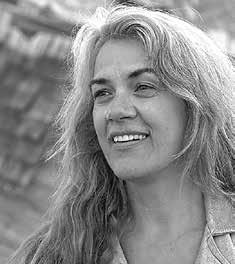
The one took among them I have read is Katherine May’s “Enchantment.” I appreciate her ability to slow us all down and find a saner way to pace ourselves, using nature as a guide. She writes: “Enchantment cannot be destroyed. It waits patiently for us to remember that we need it.” That sounds an awful like the good old words: “Mystical experience” and “Transcendence”, “Divinity” and “Holy Spirit.” A year after May’s book came out she admitted she thinks she believes in God, but continues to call it “Magic.”
New ranks of authors and researchers remind us, as if discovering the paradox for the first time, that crying out in despair and whispering thanksgiving is key to surpassing the slings and arrows of misfortune. Centuries ago the psalms were written as both lamentations and praise and meant to be recited as such, simultaneously. But who among us, even those of us raised as Christians, are aware they serve that purpose? I was never taught them. I know them because they showed up every Sunday in mass just before communion, recited in a collective drone as rote prayer, without meaning or context.
We may think high levels of anxiety are attributable only to our present day and age, but I’m old enough to recall the popularity of intellectuals like Camus, Sartre and Beckett claiming everything the grumpy new atheists do. Then Thomas Merton came along with his particular brand of poetics and side-stepped the hyper-critical intellectual approach to anxiety, introducing the West to a mystical approach. And today, in a 2023 book about the mystics called “Living in Wonder”, Rod Dreher quotes the theologian Karl Rahner as saying, in 1981, “The devout Christian of the future will either be a mystic or he will cease to be anything at all.”
BY SAMANTHA JOHNSON Prairie Rose Public Schools Content Writer
Jacalyn Poncelet joined Prairie Rose Public School (PRPS) this year as principal at New Brigden School and knew from her first day there she’d made the right decision in taking the position. Originally from Kinistino, Saskatchewan, a small town less than an hour southeast of Prince Albert, Poncelet enjoys the strong connection to community and families in a rural school.
“I went there from K-12 then away for university at the University of Saskatchewan and back to Kinistino where I taught elementary for almost 17 years. The last five years there I was focused on literacy and numeracy intervention, so I love that kind of work and working with elementary and rural education. I was so excited to return back to this.”
Poncelet moved to Alberta six years
ago to be closer to her much younger sister, who had children just starting school within PRPS in Redcliff. She worked with the Medicine Hat Public School Division (MHPSD) for six years but last year involved much driving between Medicine Hat and Oyen after her boyfriend took a position at South Central High School with the hockey academy. Now living in Oyen, Poncelet enjoys watching the prairie roll by during her 20-minute commute to New Brigden.
“I love it, every day I come here very grateful I decided to take this opportunity,” stated Poncelet. “At first, I was a bit scared because everyone was saying how long it takes to get into MHPSD and now I was leaving. I knew on day one I made the right choice, it’s like a dream job.”
In addition to being principal, Poncelet teaches grade 4-6 students. There
will be open commencing at 1:00 p.m.
Ashley D. Herrmann in attendance on Wednesday, October 30th, November 27th, December 18th
For appointments call 1-800-245-9411 or 1-403-526-2806

are 11 students in Poncelet’s class, who receives help from an educational assistant (EA) when teaching math and language arts. The Grade 4-6 EA at New Brigden is also the secretary and bus driver for the school. The K-3 class has 10 students and the teacher in that class has an EA helping four days per week. Along with the custodian, New Brigden has five staff members in total.
“It’s really nice and everyone seems to be working well together, I enjoy the family atmosphere. That was the biggest part I missed when moving from a rural to a city school, that family feel in a classroom, and you can feel it the minute you walk in the door here. Even with the older students and the younger ones, I love seeing that leadership within from the students. They treat each other like brothers, sisters and teammates.”
Currently, there are nine families sending children to New Brigden School and Poncelet met all of them during May and June this year when she came out for a few of the school events. Additionally, there was a pancake breakfast on the first day of school where she was
able to interact with the families again.
“The pancake breakfast started at 8:30 a.m. and ended at 10 a.m. We only have one kindergarten student, who left when the parents did and started school the following day. In the classrooms, we went over school rules as a group and a few other things and then went into our classrooms to start. We do buddy activities once a week, reading or other activities the younger students might need some help with from the older ones. We do wellness usually on Fridays, we are doing lots of stuff on growth mindset right now. The family school liaison worker (FSLW) and mental health capacity come in regularly and some of that is together as a group, it depends on what they are focusing on,” explained Poncelet.
This year, Poncelet is intending to immerse herself into the school culture and is looking forward to getting to know the students, families and community better. The first parent council of the year is coming up soon, which will be a new experience for her now that she is in an administrative role, and she is excited to be involved.






